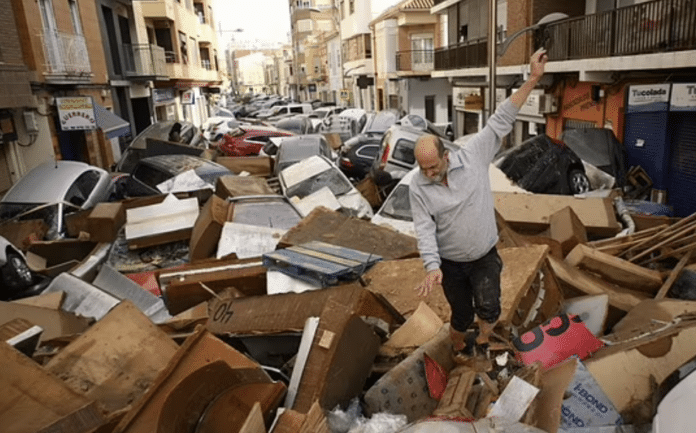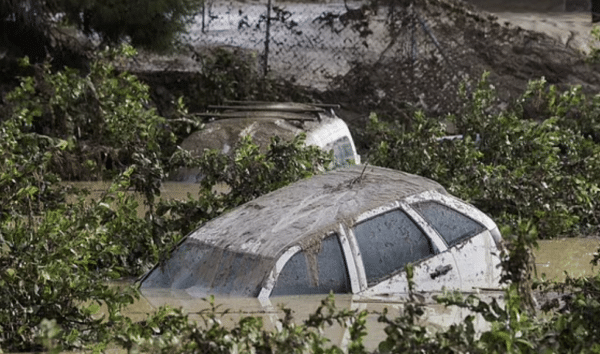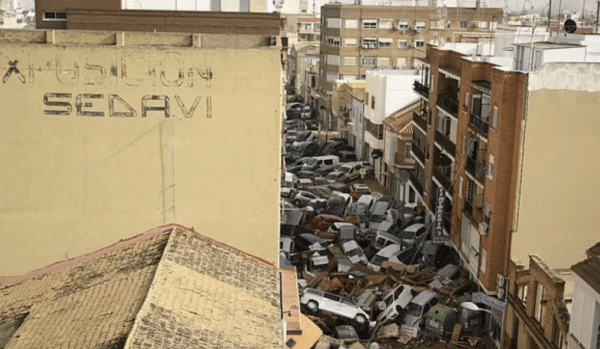
Spain is experiencing its most devastating DANA in a century, leaving a trail of death and destruction, primarily in the province of Valencia, but also severely impacting Albacete, Malaga, and Almeria. At least 100 people have died, with at least 92 in Valencia alone, as the death toll is expected to rise as many remain missing.
Emergency services have conducted 70 air evacuations and 200 land rescues, working tirelessly to save those stranded on roofs and trapped in vehicles. Power outages and extensive flooding have further complicated rescue efforts.
King Felipe VI expressed his condolences and emphasized the need to help those affected. More than a thousand soldiers from various battalions have been mobilized to assist in rescue operations. Civil Guard officers have rescued 1,200 people trapped on motorways due to accidents and roadblocks caused by the storm.
The heavy rains have led to power outages for 155,000 people and disrupted high-speed rail services between Madrid and the Valencian Community. Flights have been diverted, and rail services in Valencia remain suspended. The Aemet rain gauges recorded an unprecedented 491 litres per square meter in Chiva, causing streets to turn into rivers and infrastructure to be heavily damaged.
Spanish Prime Minister Pedro Sánchez and other officials have vowed to provide all necessary assistance and declared three days of national mourning for the victims. The DANA storm alert system has faced criticism for delays in warning the public, but authorities defended their response, citing the extreme and sudden nature of the storm.
This DANA is the deadliest natural disaster in Spain in terms of fatalities, surpassing previous floods in Biescas (1996) and the Turia (1957), and highlights the urgent need for improved emergency response and infrastructure resilience in the face of increasingly severe weather events.

Rescue phase underway with thousands still trapped
Defense Minister Margarita Robles announced that, with improved weather forecasts, the search and rescue phase for those still trapped and missing will begin on Thursday. She highlighted the uncertainty surrounding the number of missing people. Robles detailed that 15 helicopters and 18 drones from the Military Emergency Unit (UME) are involved, with 22 bodies recovered and 110 people rescued alive.
“These tasks will continue throughout the night, but tomorrow, we have to start the second phase, which is the search and rescue,” she said in an interview on ‘Hora 25’. Robles emphasized that the UME will launch the operation once the area is cleared and the weather improves, with the help of rescue dogs.
The minister assured that both the Army and the Air Force will assist in the rescue efforts using helicopters and drones. She acknowledged the exhaustion and personal challenges faced by the rescue teams but guaranteed that the UME will remain on-site as long as necessary.
Robles mentioned that there are currently no known supply issues, but she would address any that arise. She also noted that several psychologists have been sent to the area to support those struggling to find their families, emphasizing the importance of psychological and military support.
“It is very hard for everyone, and I would like to send all my love, support, and pride in the work carried out by our soldiers from the UME, the Army, and the Air Force,” she concluded.

Blame Game underway as Civil Protection accused of delays
Spain is reeling as people now start to trigger the blame game as disaster relief services face accusations of being slow to react.
The civil protection agency, which is deployed during natural disasters, did not issue an alert until 20:15 local time on Tuesday, by which time significant damage had already occurred. El Mundo highlighted the late warning, noting that hundreds of people were trapped overnight due to road closures and blocked access.
Recriminations are flying on social media, with many criticizing local governments for inadequate preparation. The regional president of Valencia, Carlos Mazón, is defending his controversial decision to eliminate the Valencia Emergency Unit (UVE), which had been established to respond to weather-related emergencies. Critics argue that cost-cutting measures have worsened the impact of extreme weather.
Climate activists and experts have called for urgent action to address climate change, citing it as a cause of the floods. Greenpeace Spain’s executive director, Eva Saldaña, emphasized the real and deadly impact of the climate emergency. Jorge Olcina, a climate scientist, explained that the floods are evidence of climate change altering rainfall patterns, and warned that people need to heed meteorological warnings even when they want to maintain normalcy.




